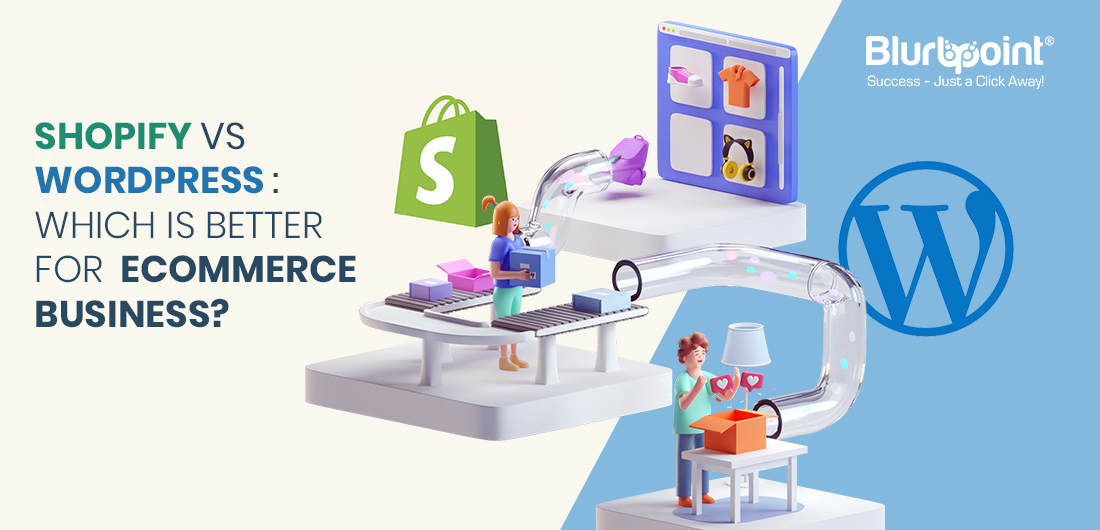GET A FREE CONSULTATION



Posted by Sandeep Sharma
April 12, 2022
As an eCommerce entrepreneur or business owner, your website is the most crucial part of your organization. It is the place where you get an opportunity to meet your potential customers and learn more about their needs and preferences. Choosing the right platform to launch your business eCommerce website can be a challenging task especially if you don’t know where to begin from. There are several eCommerce platforms on the internet to choose from however, Shopify and WordPress remain the most popular and significant ones
Both Shopify and WordPress, consist of features that make selling and sharing content online much simpler and more convenient for brands. If you are eager to learn more about Shopify Vs WordPress and determine the platform that suits your business needs the best, then you are in the right place. This blog post consists of an insightful comparison between Shopify Vs WordPress that can help you make wise decisions for the growth of your business.
Shopify is a hosted eCommerce business platform that offers comprehensive solutions from setup to selling your products to certain locations or across the world. It consists of multiple packages and features that assist you in setting up your business on online platforms. Shopify is a cloud web application that does not allow users much control over a self-hosted solution. Shopify however, allows you to edit the HTML and CSS and focus more on using built-in options to change the themes. It offers a range of customizable themes to choose from. You can adapt the theme that suits your business style and preferences the best.
Generally, there are three major plans offered by the Shopify program. If you are facing budget constraints then you can opt for the cheapest Basic Shopify plan. It consists of a 14-day free trial option and is an ideal option for medium to very large eCommerce stores.
WordPress is an open-source content management system (CMS) that allows you to host and build eCommerce websites. WordPress also allows you to get total control over HTML and CSS core technologies to run many types of websites. WordPress can be both hosted by you and self-hosted as there are many providers online to choose from. WordPress can be an ideal option for both small and large-size eCommerce websites. It is the most powerful and flexible blogging and website builder software in existence today.
Now let us look at the reasons why the Shopify platform is the best option for your eCommerce site and the ways you take advantage of the same.
As an eCommerce business owner, you would also want a website builder that offers numerous Shopify theme options to choose from. With a variety of these options, you get an option to select the one that suits best your business style and preference. Shopify offers over 70 professional and customizable eCommerce store themes to all its users. It offers both paid and free mobile-friendly theme options to choose from.
With this feature, you can enjoy selling your products and services on multiple platforms online. Selling your products to one platform can limit your reach and might even make you lose several customers if you don’t know which platform can help you reach huge amounts of audience. Using the wrong platform can also have adverse effects on your brand image. Shopify helps you sell your products on multiple websites including Facebook, Instagram, Amazon, eBay, and more.
Even if you don’t have any prior experience in web designing, with this Shopify feature you can craft your dream website effectively and effortlessly. This feature offers you a drag-and-drop builder option where you can position elements on your eCommerce site, wherever you want as per your preference and needs.
When you use different platforms to design your website you would also want to access multiple features in one place. On Shopify, you get access to their app store to add and create more functionality to your eCommerce site. With the app store, you get an opportunity to build and customize your website the way you want and optimize for Shopify SEO. From subscription sales to customer support and shipping, you get access to all types of applications on Shopify.
Website builder platforms also come with a few drawbacks. Here we have listed a few cons of using Shopify for your eCommerce website.
The Fees structure is one of the most significant drawbacks of Shopify. Despite having multiple breakthrough features Shopify can give you a tough time when it comes to its multiple expensive structures.
With Shopify, you have to spend some money to build your site. You will have to first invest money in a template for your website unless you choose a free template for a temporary period. Depending on what you pick, these templates can cost you a huge amount of money.
Another drawback of using Shopify is that you also have to pay transaction fees every time someone purchases from your site. The transaction fees can vary depending on the type of plan you choose and the payment option opted by the customers.
Unlike WordPress, Shopify is not an open-source platform. This means you do not have much freedom when it comes to constructing your website. It relies heavily on templates to build your website. If you do not have any prior knowledge or experience in web designing or web development then Shopify can be an ideal option for you.
Moving your online store to a different platform from Shopify at times can not be a smooth ride. It limits your ability to migrate your store to another platform. The only item or asset that you can take from Shopify during your exit is the CSV report containing your product information.
Compared to WordPress, Shopify does not have much user-friendly built-in blogging software. The blog layouts offered by Shopify are inflexible and lack useful elements such as galleries. At times it can also be difficult for you to add related posts to your blog.
If you are planning to use WordPress to build your eCommerce sites then you must look at the following pros of using WordPress.
Plugins play the most crucial role when it comes to building an eCommerce site. Plugins can help you craft a functional website, boost your business, and gather a huge amount of traffic effectively. One of the most significant and popular WordPress plugins is WooCommerce. WooCommerce plugin offers a ton of great features including TrustPluse, Cart Recovery, WP product review lite, and Sucuri to help you turn a WordPress site into an eCommerce store.
WordPress offers around 8,000 theme options and over 1,200 eCommerce-focused templates for you to choose from. This can help you build a unique style and design for your websites effectively. You can also choose the theme and template options that fit well with your business needs and style.
Another thing about building a WordPress eCommerce website is that you can design and create an SEO-friendly site over the internet. With the help of various SEO plugins, such as RankMath, and Yoast SEO alternatives you can effectively improve and optimize your website ranking on various search engine pages and drive more traffic to your website.
At times not all types of plugins, themes, and templates offered by different types of website builders are responsive on all types of devices. However, WordPress is known for offering the best and most responsive features compared to the other website builder platforms.
Now let us look at the reasons why WordPress might not be the right choice for your eCommerce business website.
WordPress is not specifically designed to build eCommerce websites. You can create dozens of different types of sites with WordPress, however, it isn’t focused entirely on building eCommerce websites. This way you might miss out on some crucial features while developing your eCommerce store.
The biggest struggle using WordPress is getting all the plugins to work. At times, some plugins are not compatible with one another and might consume a lot of time to build your site. If you don’t have any prior experience in designing a website then there are possibilities where you can miss out on some important plugins which can negatively impact your business and raise some serious problems.
Updates on WordPress can sometimes bring small problems to your website where you may have to revert to an older version of the WordPress website. You must make sure to check for your data after the update, at times you might also lose the same when you opt for an updated version of the theme, template, or other related features.
Due to a lot of unnecessary generic codes, the WordPress site might slow down and perform tasks at a much lower speed. This can affect the daily performance and efficiency levels of your website. If you are not willing to have a slow-functioning website builder platform then you must consider opting for another platform for your business.
When it comes to User Interface (UI), Shopify’s intuitive GUIs are quite easy to get started with, while using a mobile device or computer. On the other hand, WordPress isn’t as intuitive and it can be challenging to set up and maintain a website built on WordPress.
WordPress consists of about 8,000 themes from the official directory, whereas Shopify offers about 10 free themes and 70 paid themes to choose from. With WordPress, you can explore a variety of theme options.
Shopify follows the best SEO practices such as URL slugs, metadata, and eCommerce sitemaps. Furthermore, WordPress is also an SEO and semantic mark-up-friendly platform that supports schema (Rich snippets) and can secure titles and meta descriptions. In this situation, Shopify has a slight advantage over WordPress SEO friendliness.
When it comes to marketing tools and features, WordPress has a more extensive list of marketing tools, features, and plugins such as MailChimp. WordPress is a clear winner in terms of marketing your website to different audiences.
Shopify offers more than 100 payment options along with its own Shopify payment to the users. Both Shopify and WordPress offer comprehensive payment options however, Shopify is more straightforward.
Shopify pricing plans are quite different and complex compared to WordPress pricing plans. Most WordPress eCommerce plugins are free to use and easy to access compared to Shopify.
Lastly, both Shopify and WordPress offer excellent customer support to their customers. Shopify offers an extensive guide, tutorial section, and 24/7 live chat options to its users. WordPress on the other hand has a very active and responsive customer support team that ensures to resolve of complex user issues effectively and quickly.
By far we hope you now have a detailed understanding and knowledge about both Shopify and WordPress platforms. Which one to choose primarily depends on your website needs and requirements. Both Shopify and WordPress are great platforms for eCommerce SEO.
Building an eCommerce website is not an easy task. It requires the utmost knowledge and understanding of various aspects of the eCommerce business. We hope this post was helpful to you in many ways and that you will be able to make sound business decisions while selecting the right platform for your eCommerce business.
